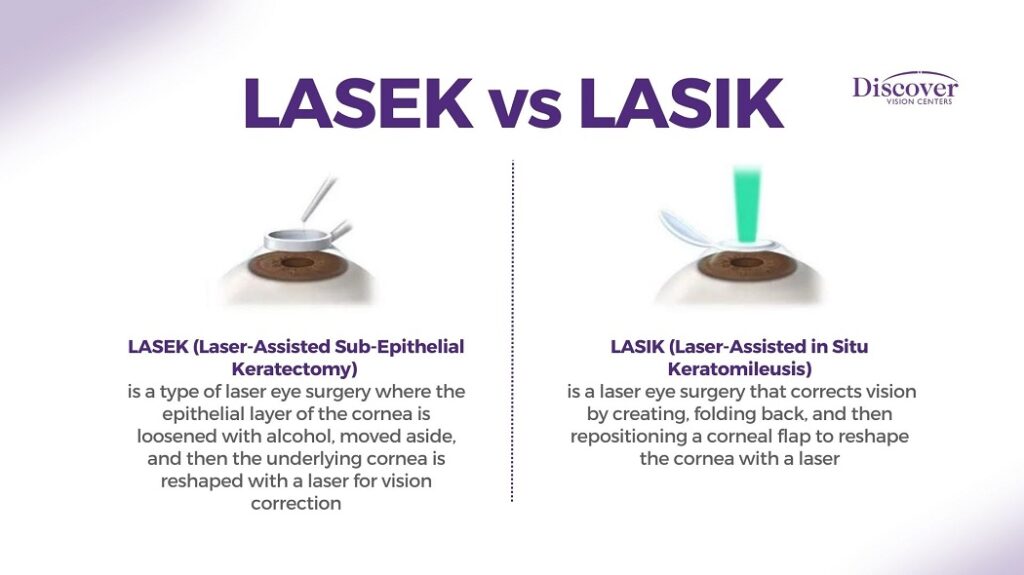
When considering laser vision correction procedures, LASIK and LASEK are two of the most popular options. Both eye surgeries aim to correct common vision problems like nearsightedness, farsightedness, and astigmatism. While they share the goal of enhancing vision clarity, they differ in their approaches and suitability for different eye conditions.
Understanding these differences can help you determine which procedure aligns best with your vision correction needs. This guide delves into the essential distinctions between LASIK and LASEK, exploring their respective benefits and limitations, to help you make an informed decision about your eye care journey.
This comprehensive comparison between LASIK and LASEK provides insights into each laser eye surgery specifics:
| LASIK | LASEK | |
|---|---|---|
| Procedure | Involves creating, folding back, and then repositioning a corneal flap to reshape the cornea with a laser | The cornea’s epithelial (surface) layer is loosened using alcohol, moved aside, reshaped with a laser, and then repositioned |
| Recovery Time | Typically quicker, with most patients seeing vision improvement within a day | Generally takes longer than LASIK, with up to a week or more for full eye healing and vision stabilization |
| Pain During Recovery | Usually minimal discomfort | More discomfort due to the healing of the corneal surface layer |
| Risk of Complications | Potential for flap complications, though rare | No risk of flap complications but may have a slightly higher risk of corneal haze that is usually transient |
| Best Candidates | Less ideal for individuals with thin, irregular-shaped corneas, or those in combat sports | More appropriate for people with thin corneas, dry eye history, or active in combat sports, as it does not involve creating a flap |
| Side Effects (Usually Temporary) | Some patients experience dry which is usually transient, rare corneal flap dislocation, light sensitivity, bruising, scratchy sensation, and eye pain | Involves discomfort, blurry vision (stromal haze), eye pain during recovery, slower healing than LASIK |
| Cost | Approximately $3,000 to $6,000 for both eyes | |
| Effectiveness for Vision Correction | Recognized as safe and effective methods for vision correction | |
| Treated Conditions | Effective for nearsightedness, farsightedness, and astigmatism | |
| Number of Treatments | Typically a single session is sufficient | |
LASIK Procedure:
LASEK Procedure:

LASIK:
LASEK:
Patients undergoing LASIK generally experience less discomfort compared to those having LASEK surgery. LASEK, due to the removal and reattachment of the corneal layer, often leads to more discomfort and a longer healing process.

Both surgeries are considered safe, but they have different risks. LASIK may involve complications related to the corneal flap, such as dislocation ( rare ) or inflammation ( uncommon and short-lived ). LASEK, being a surface treatment, eliminates the risks associated with a flap but may have a higher likelihood of postoperative haze.
LASIK is often preferred for individuals with thicker corneas, as it requires creating a flap. LASEK, on the other hand, is more suitable for those with thin corneas or lifestyles involving combat sports, as it does not involve flap creation. However, an ophthalmologist can help determine the suitability for either procedure based on a thorough examination of the patient’s eyes.
Here, we outline the advantages and disadvantages of each procedure to assist in your decision-making process.

Advantages of LASIK Treatment:
Disadvantages of LASIK Surgery:
Advantages of LASEK Eye Treatment:
Disadvantages of LASEK Eye Surgery:

Prospective patients will find that the prices for both procedures often fall within a similar range, typically between $3,000 and $6,000 for both eyes. However, it’s common to see LASIK surgery priced slightly higher than LASEK. This difference in cost is mainly due to LASIK requiring two lasers – one for creating the flap and another for the reshaping of the cornea – whereas LASEK involves a single laser for the reshaping process.
Factors influencing the cost of both LASIK and LASEK include:
It’s important to note that both LASIK and LASEK are typically considered elective procedures and aren’t usually covered by standard health insurance plans. However, they’re eligible for medical expenses for flexible spending arrangements (FSAs) and health savings accounts (HSAs), providing an avenue for patients to manage their costs.
At Discover Vision Centers in Kansas City, MO, we understand the importance of making an informed decision about your eye health. Our team of expert ophthalmologists is dedicated to providing personalized care and guidance to help you choose the laser eye surgery that best fits your vision needs and lifestyle.
We invite you to schedule a consultation with us to explore your options for achieving clearer, improved vision through LASIK or any other laser or refractive surgery. Let us be your partner in your journey towards enhanced visual clarity.